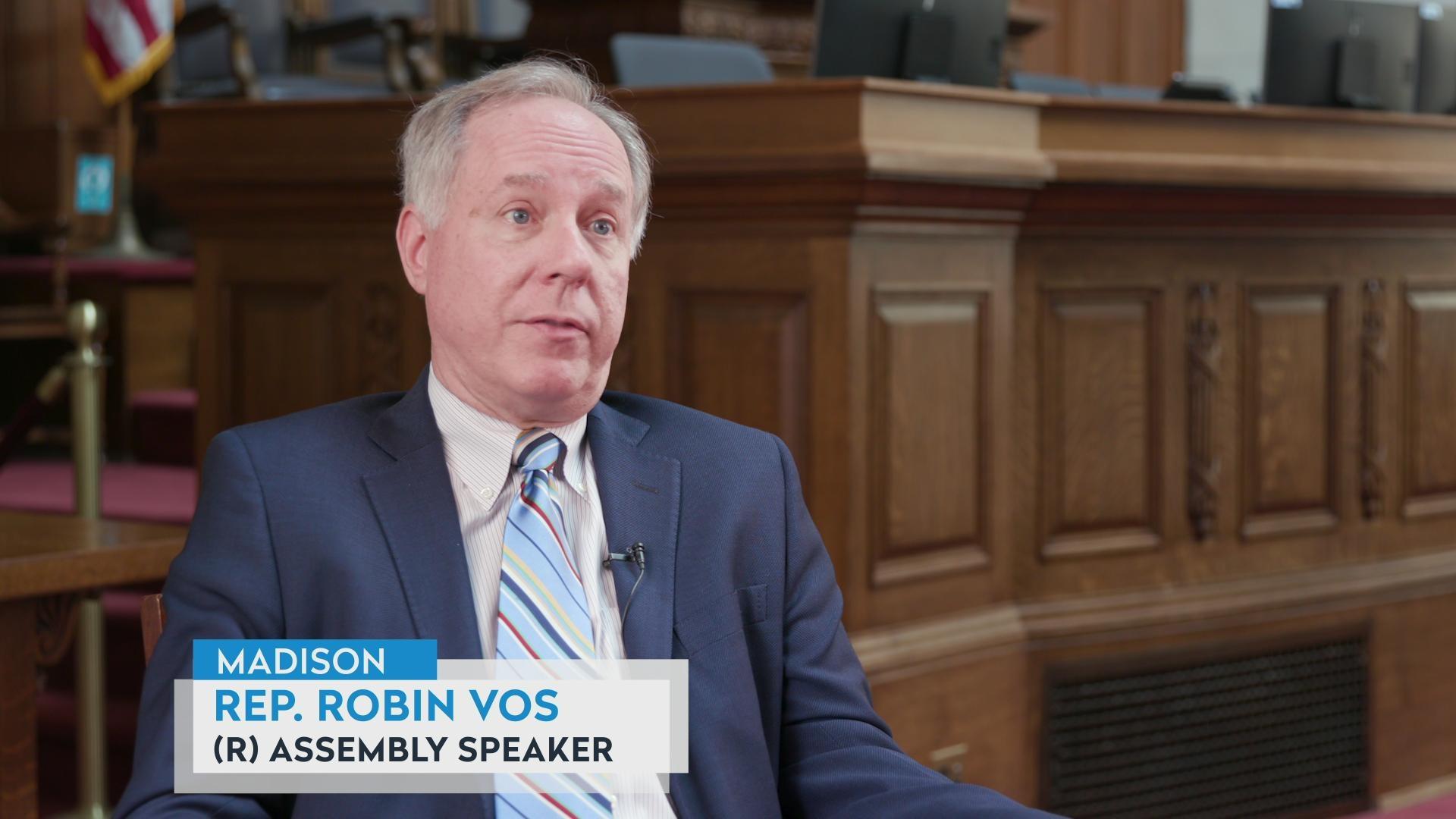Frederica Freyberg:
After Republican election wins in November, Wisconsin senior senator, Ron Johnson, will take over as chairman of the Homeland Security and Governmental Affairs committee, replacing Arizona senator, John McCain. That committee has broad jurisdiction over operations of the federal government and Department of Homeland Security. In an interview withUS TodayJohnson said he wants to focus on border security, illegal immigration, cybersecurity, home-grown terrorist threats and securing the electrical grid. Johnson also has a court challenge to the Obama administration's health care overhaul. Joining us this week from Milwaukee is United States senator, Ron Johnson. Senator, thanks for being here.
Ron Johnson:
Well, Frederica, how you doing?
Frederica Freyberg:
Really well, thanks. First up, before all of that other stuff that we talked about in the lead, we wanted to get your reaction to the restoration of diplomatic relations with Cuba announced this week.
Ron Johnson:
Well, unfortunately President Obama again is acting unilaterally, really without any consultation with congress so you’re seeing the negative reaction on a bipartisan fashion. There’s been some support. But I think we can all agree that 50 years of these sanctions unfortunately has not changed Cuban policy toward its people. But the regime hasn’t changed. So sanctions, I think, were always intended to be able to be used as the carrot and the stick for the next leaders of Cuba once the Castros exit the scene. And unfortunately by bargaining away those incentives, it’s going to be very difficult, I think, to really do what the Cuban people actually want, is restore a freedom of expression, have independent parties, have democracy. And that’s just not going to happen. We have very bad people in the Castros, and we’re actually strengthening their hand.
Frederica Freyberg:
So you are just off the big showdown in Washington over the trillion dollar spending bill. Why did you vote, no, on that?
Ron Johnson:
Well, it’s an awful process. I really hope that is the last massive spending bill that ever gets brought before the senate during my tenure. What Republicans are dedicated to do now that we have a majority is we’ll pass budgets, use that budget to, you know, as the control over 12 individual appropriation bills. They’ll still be large, but if we bring them through regular order, through the committee process, onto the floor of the senate, open debate, allow every senator to offer whatever amendments they want to improve the piece of legislation, that’s the way you start prioritizing spending, that's the way you can start eliminating the duplicated programs, the waste, the fraud, the abuse. So really it’s vote against the process. In any 1,600-page bill there is going to be a lot of bad stuff. There’s also going to be some good stuff. Hopefully, that’s the last time I have to vote against a bill that massive.
Frederica Freyberg:
Again, you voted, no, based on process?
Ron Johnson:
Primarily, but let’s face it, it's a 1,600-page bill. I would say there’s probably no member of the senate that had time to go through 1,600 pages to find out what all was in it. That’s just a bad way of doing business.
Frederica Freyberg:
As incoming senate committee chair of Homeland Security, immigration falls squarely in your legislative lap, I would think. What’s your reaction to the agency being funded through February as a means of pressuring the president over his executive order on immigration?
Ron Johnson:
Well, I don’t agree with President Obama’s unilateral action. First and foremost, it’s just a really bad way to start a new relationship. In business, when I negotiate, I don’t start arguing right away with my negotiating partner. I sat down and tried to figure out all the areas of agreement. That’s certainly how I’m going to approach my chairmanship in Homeland Security is find areas of agreement, whether it's border security, providing national security, or whether it's regulatory reforms. What President Obama has done, he’s actually created additional incentives for illegal immigration, so it’s going to be even more important that we secure our border.
Frederica Freyberg:
What would you like to see done, on immigration specifically?
Ron Johnson:
Well, the first step really is that we have to secure the border and we have to enforce the immigration laws on our books. Plus, we need to look at those laws and eliminate or drastically reduce all the incentives created by our immigration laws. For example, the deferred action that President Obama took on children, it really caused that flood of children coming in from Central America. His deferred action now on millions of other people here illegally in this country is going to create further incentives for people to come in here. I mean, people will forge documents. It’s going to be very difficult to control who has been here five years. How are they going to pay taxes? So the first step in any immigration system that’s going to work is we have to secure our borders, enforce our laws. There are plenty of things we can do. That will be our first task.
Frederica Freyberg:
Now, another role on the committee will be cyber security, a hot topic right now obviously. The publicationThe Hilldescribes you as “cyber-friendly.” What does that mean?
Ron Johnson:
I’m not exactly sure. I hope it means that I recognize that these cyber attacks are a real threat to our national security, to our infrastructure, to our electrical grid. And you know, congress has known literally for years that this is a real threat to this nation, but we haven’t been able to take even the first step that every witness that I ask to come before our committee, what is the first step that we need to take in terms of securing our cyber assets? It’s information-sharing. We have got to facilitate the ability of the private sector to share information with the federal government. Federal government’s really got some excellent capabilities in this area, but we don’t have the process set because, quite honestly, trial lawyers will not allow Democrats to vote for the liability protection that is necessary for a free flow of information between the private sector and the public sector. So hopefully, this instance with the North Korea and Sony will create the public pressure to allow us to facilitate that information-sharing.
Frederica Freyberg:
You have ideas, also, on federal work force reform. I understand it has to do with cutting pay and benefits and getting rid of the unions? Is that accurate?
Ron Johnson:
No, no, no.
Frederica Freyberg:
No?
Ron Johnson:
No. What happened when we had the super committee during our last budget fight in 2011, the committee of my jurisdiction was a subcommittee of the same committee, and we just issued a letter indicating about $1.4 trillion of potential areas for the super committee to take a look at. One of those areas was just reduce the federal work force through attrition. Not firing anybody, but just not hiring people. That would have saved about a quarter trillion dollars. Freezing pay and benefits would have saved another quarter trillion dollars. And what I My primary point is, like in business, we need to benchmark. And we should benchmark what the private sector pay is versus what federal government pay is and make sure those things are in alignment. Nobody wants to under-pay federal employees, but we can’t afford to over-pay them either. So I think those– You know, that letter has been taken out of context and overblown.
Frederica Freyberg:
Now, on the Affordable Care Act, are you still onboard with trying to repeal and replace it?
Ron Johnson:
Yeah, I would repeal Obamacare in a heartbeat. Also some misreporting. I also recognize the fact that Obamacare now is the law of the land and it’s going to be integrated into our health care system. So it’s not such a simple matter of repealing a piece of paper and having it go away. Now we're going to have to figure out how to transition away from this. I think what we should be doing as responsible elected officials is we need to be looking at what we can do to limit the damage, repair damage that’s been done by this health care law. I think there’s plenty of areas of agreement. Let’s restore the 40-hour work week. Even 79 senators voted to repeal the medical device tax which literally is shipping jobs overseas. So there’s a lot of things we can do until, hopefully, we get a Republican president who’s willing to really work with us to repeal most of the bad parts of this law and replace it with patient-centered, free market reforms.
Frederica Freyberg:
All right. Senator Ron Johnson, thanks very much for joining us.
Ron Johnson:
Have a Merry Christmas.
Frederica Freyberg:
You too.
Search Episodes
News Stories from PBS Wisconsin

Donate to sign up. Activate and sign in to Passport. It's that easy to help PBS Wisconsin serve your community through media that educates, inspires, and entertains.
Make your membership gift today
Only for new users: Activate Passport using your code or email address
Already a member?
Look up my account
Need some help? Go to FAQ or visit PBS Passport Help
Need help accessing PBS Wisconsin anywhere?

Online Access | Platform & Device Access | Cable or Satellite Access | Over-The-Air Access
Visit Access Guide
Need help accessing PBS Wisconsin anywhere?

Visit Our
Live TV Access Guide
Online AccessPlatform & Device Access
Cable or Satellite Access
Over-The-Air Access
Visit Access Guide
 Passport
Passport


















Follow Us